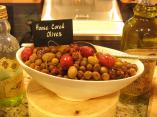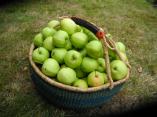After seeing Forks Over Knives, I tracked down an audio copy of The China Study, which was excellent listening material while I peeled and juiced a zillion apples earlier this month. And then I had occasion to watch the film again last weekend. Food for thought, as they say. Vegan food.
I’m always a little skeptical of dogmatists, and the book and film are very dogmatic in their condemnation of casein (milk, cheese, yogurt, butter.. ) and other animal proteins. They do present facts and figures to back up their assertions; and the case does seem overwhelming even on a superficial comparison between Western and Eastern diets, for example. Obesity and food-related illnesses are unquestionably out of control in countries that have adopted the Western diet, and rare in those that have stuck to simpler, vegetable-based fare.
The film showed a very dramatic chart from Norway before, during and after the Nazi occupation, which marked a dramatic drop in fatal heart attacks during the war and a steep climb afterwards, and we were told this was due to the population’s having been deprived of animal protein during this time. But that’s not all they were deprived of: cigarettes were also unavailable. The authors of a study reported last March took a more well-rounded view, observing instead that during the Occupation, “Norwegians ate less fat, smoked less and were more physically active.” (The study compared recent improvements in Norway’s fatal heart attack figures with numbers last seen during the Occupation.)
Veganism is certainly not going to hurt you, which is more than can be said for the Western diet. But is it going to take off? I’m guessing not. Firstly, as a lifestyle it has a bad reputation (see how Anthony Bourdain shat upon it for example) for attracting dogmatists, animal rights extremists, and nutritional puritans. It can be hard for moderate, health-oriented eaters to self-identify with the term (although Bill Clinton’s entry into the fold has probably helped ease the way for others). And, as many of us have witnessed first-hand with vegan dining companions, it becomes really hard to eat [well] in restaurants – or in the homes of nonbelievers.
Secondly, it takes a lot longer to cook vegan food. Unless you plan to live entirely on salads or steamed vegetables, it can take a lot more planning. Whole foods (I’m assuming we’re talking whole food veganism rather than junk food veganism) take longer to cook (think brown rice vs white); dried beans or the seeds and nuts that raw food vegans use need hours of soaking. Fresh fruit and vegetables take chopping, paring and preparation. And we live in the age of convenience when half an hour’s cooking per day is fairly typical. Per day! (Statistics Canada’s 2005 census said .7 to 1.1 hours, including washing up)
Thirdly it’s just mostly not very interesting food. How I wish the film-makers had sprung for a food stylist instead of trotting out grey platters of rice and beans and less than vivid salads, and then showing the eaters oohing and ahhing over them. The book and film say this food is delicious as well as healthful. But I’m sorry, it’s just not inherently better tasting, or even anywhere as good in most cases. The China Study‘s directions are no added oil; whole grains only; no meat proteins. But oil is what carries flavours and lets them wallow in your tastebuds. Chefs and cooks of all nationalities have spent centuries developing recipes to please the human palate (not talking Western diet here, of course, although that has been developed to create a kind of addiction that can be mistaken for pleasure). And that food was designed for pleasure, for flavour, for texture and appearance. Not for health-giving benefits alone. As Bourdain also says, his body is not a temple, but a playground.
So we have a fundamental division of purpose. I don’t mind being pointed towards a healthier diet, but I do mind being told it’s delicious when it looks horrible, and too often tastes awful. I know that’s a sweeping generalization. And I also know there are some delicious foods in the vegan repertoire (kale chips! Green Cuisine‘s lasagna! Ottolenghi’s green bean salad!) and more to discover and experiment with, which I’m happy to do after a lifetime of meat-based cooking. I know it’s possible to eat really delicious Indian food that is vegan – but very far from fat-free.
And I also know there are lots of good reasons not to eat meat, and certainly not every day. Just in time, the Meatless Monday campaign has a new video:









